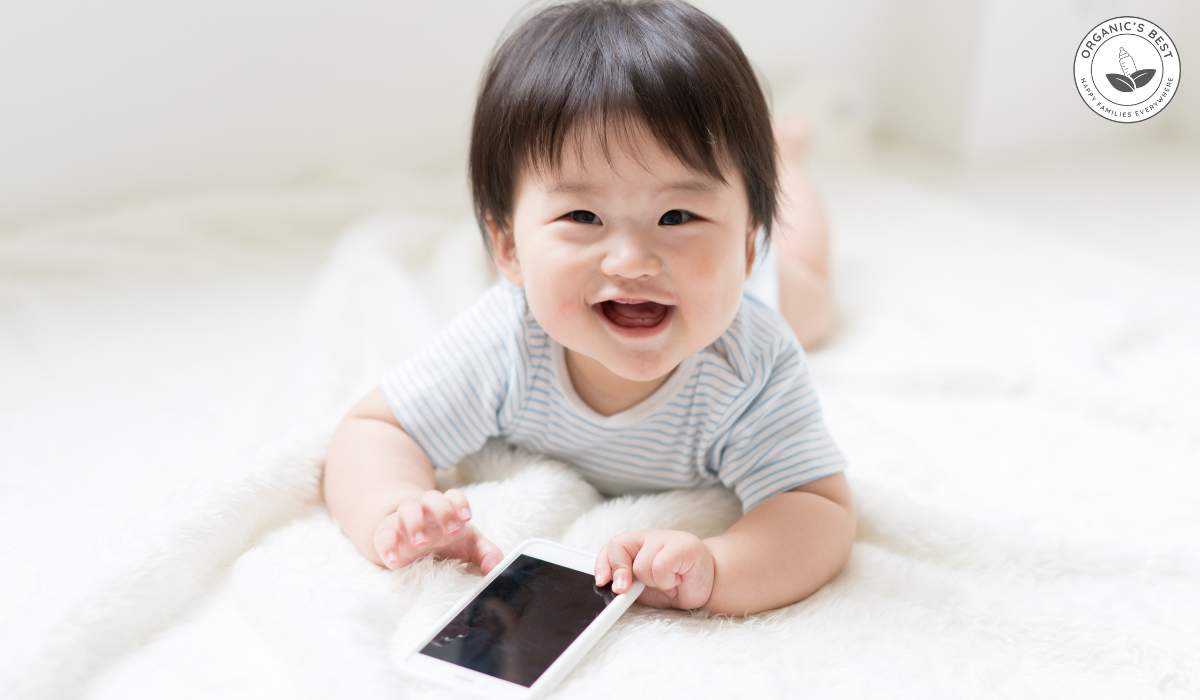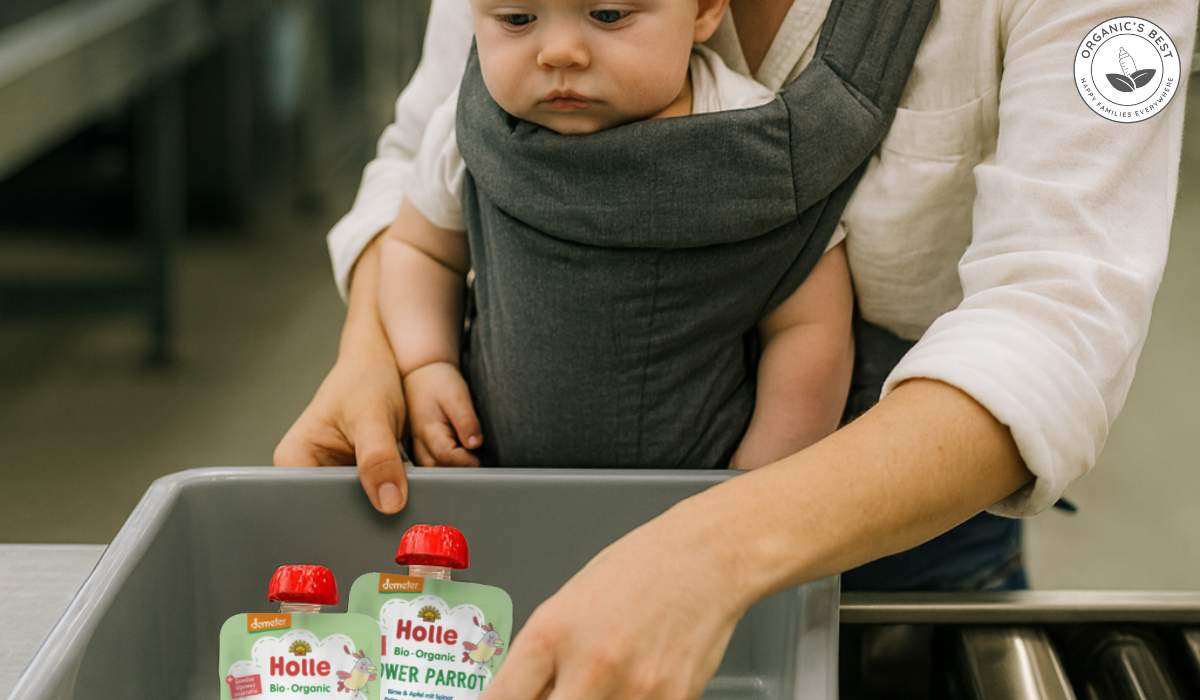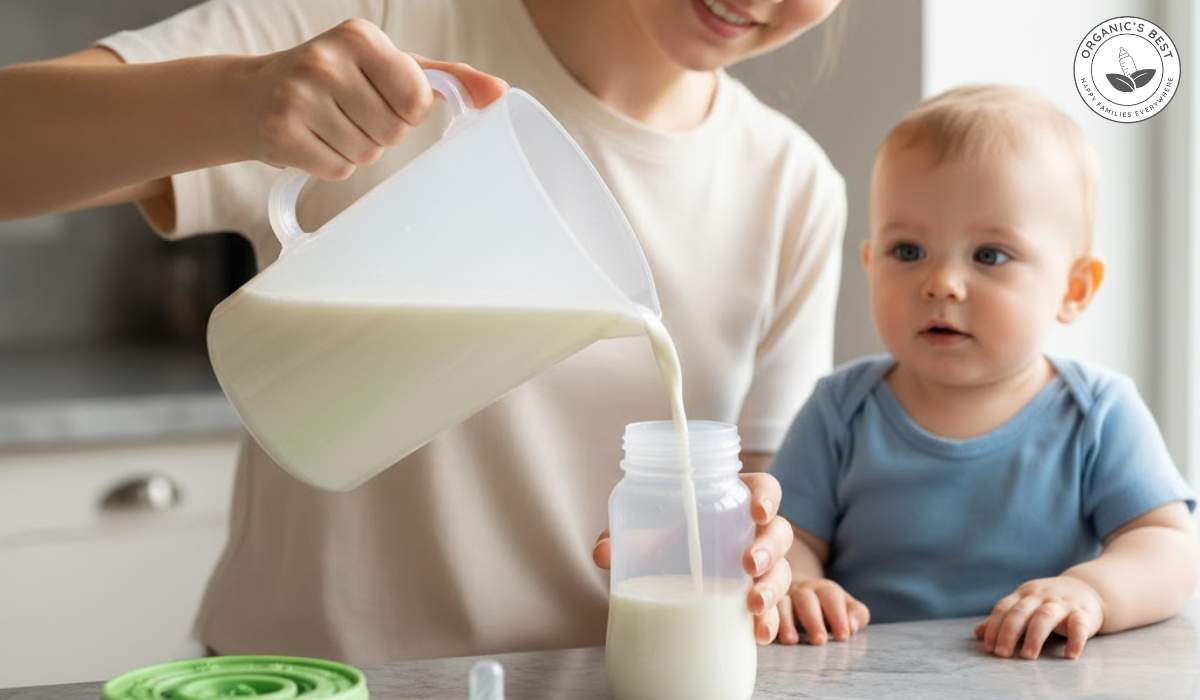Click to Get 2 FREE Boxes/Cans
Only New Customers! Click HERE to Get 2 Extra Boxes/Cans for Free With Your First Order.
BABY FORMULA
Offering new parents top-quality European infant formula from renowned brands like HiPP, Holle, Kendamil, and more. If you’re uncertain about which product to choose, our Formula Finder can help you make the best decision for your baby.
Baby Food
Offering new parents a premium selection of European baby foods, including jars, pouches, cereals, and snacks from esteemed brands like HiPP and Holle.
Screen Time for Kids: The Effects Of Letting Babies And Toddlers Use Smart Phones
by Agustina Fernandez October 21, 2025 7 min read

In your little one's first few years of life, their brains are growing and changing faster than at any other time. During this stage, children are soaking up the world around them like tiny sponges.
The habits they form at this point, from how they eat and move to how they interact with others, and engage with screens, can shape their development for years to come.
Did you know that by age three, a child's brain is already around 80% of its adult size? This reinforces the fact that the routines and behaviours they're exposed to now can have lasting effects.
In fact, research shows that much of the brain's foundational structure and function is established by the second year of life, or even earlier, making these years a critical time to set healthy patterns.
When you're running on empty as a parent, handing over a phone or tablet, complete with endless entertainment, can seem like a great solution, and sometimes it is!
However, moderating screen time for babies is key when it comes to keeping your child interested and engaged with the world around them.
In this article, we're talking about smart ways to use smartphones. You'll learn how screen time affects children's developing brains and discover useful strategies to set healthy boundaries around tech use.
Table of Contents
Understanding Screen Time for Babies
Whether it's kids watching TV, scrolling through videos on a smartphone, or getting lost in a video game, there's no denying that most children find screens entertaining from a very young age.
Having access to this very interesting and accessible virtual world means that setting screen time rules for kids is important for making sure that they don't overdo it, but how much screen time for kids is an appropriate amount? We will get into that below.
During the first few years of life, a child's brain is developing at lightning speed. It is forming neural connections that shape everything from language and movement to emotional regulation. Too much screen time at this age can interfere with those crucial developmental processes.
 That doesn't mean all screen time is harmful. Too much screen time for kids isn't the best, no matter what they are watching; however, the quality of what children watch matters just as much as the amount of time they spend watching.
That doesn't mean all screen time is harmful. Too much screen time for kids isn't the best, no matter what they are watching; however, the quality of what children watch matters just as much as the amount of time they spend watching.
High-quality, educational content designed for young audiences, especially when co-viewed with a parent, can have some positive effects, such as improving vocabulary and early learning skills. In contrast, background TV or fast-paced, non-interactive shows offer little benefit and may even distract from valuable play and bonding time.
According to the American Academy of Pediatrics (AAP), baby screen time should be avoided entirely for those under 18 months, except for video chatting with family.
For children aged 2 to 5 years, the AAP recommends that the average screen time for kids should be no more than one hour per day of high-quality programming. However, in some parts of the world, research shows that only 15% of children aged 3 to 4 years meet screen time guidelines of <1 h/day.
Beyond those limits, encouraging hands-on play, outdoor exploration, and real-world social interaction is essential for supporting healthy development.
In short, while screens can sometimes offer a moment of calm or connection, mindful use is key. The goal isn't to eliminate technology, it's to use it smartly, in ways that support growth rather than replace it.
What Are the Effects of Screen Time on Children?
While we may have already outlined some of the downsides of screen time for children, screen time isn't inherently "bad," but too much of it, especially when it replaces hands-on play, face-to-face interaction, or sleep, can have noticeable effects on a child's development.
Research has shown that excessive screen use in young children may contribute to the following:
-
Delayed speech and language development: Babies and toddlers learn language by hearing it, mimicking it, and engaging in back-and-forth conversation. When a screen becomes their primary source of "talk," it often lacks the responsiveness and emotional cues that human interaction provides. As a result, children exposed to too much passive screen time may take longer to form words, understand tone, or grasp the rhythm of conversation.
-
Reduced attention span: Fast-paced, brightly colored shows and games can overstimulate the brain, training children to expect constant excitement and instant gratification. When real life doesn't move as quickly or provide the same dopamine rush, it can be harder for them to focus on slower, imaginative play or sit through classroom activities later on.
-
Disrupted sleep: Screens, especially those used close to bedtime, emit blue light that can interfere with the body's natural production of melatonin, the hormone that signals it's time to sleep. Add in the mental stimulation from videos or games, and it's no wonder many children struggle to wind down at night. Over time, poor sleep can impact mood, memory, and even immune health.
-
Lower physical activity levels: Simply put, time on screens is time not spent moving. Physical play, like crawling, climbing, running, and jumping, is super important for developing coordination, muscle strength, and overall health. Sedentary habits formed early in life can carry into later years, increasing the risk of obesity and other health issues.
Beyond these effects, there's also the matter of social and emotional growth. Real interactions involve making eye contact, reading facial expressions, and playing with peers, which all help children develop empathy and communication skills. When screens dominate their attention, opportunities to practice those social cues may not be as frequent.
How to Manage Screen Time for Kids
Creating healthy screen time for kids doesn't have to be a daily struggle. A few intentional habits can help create balance and expectations around how screen time will be managed in your home:

-
Be a role model: Children are natural imitators. If they see you constantly checking your phone or scrolling during meals, they'll see that as normal behavior. Setting your own boundaries, like putting devices away during family time or leaving your phone in another room before bed, shows kids that screens aren't the center of everyday life.
-
Co-watch when possible: Turning screen time into a shared experience makes a world of difference. Watching a show together or exploring an educational app side by side gives parents the chance to engage, ask questions, and help their child connect what they see on-screen to real-life learning.
-
Encourage active over passive use: Screen time parental control isn't just about limiting minutes; you should focus on curating content that encourages creativity and learning. Choose apps that inspire problem-solving, movement, or imagination over fast-paced videos or background TV.
-
Create a routine: Children thrive on predictability. Establishing a set routine for when and how long screens can be used, such as after homework or before dinner, helps reduce daily battles and teaches self-regulation.
-
Balance with offline activities: Screen time should complement, not replace, playtime, reading, and outdoor adventures. Encourage activities that engage your child's senses and creativity.
Screen Time Recommendations By Age Chart
To help practice screen time management for kids, you can reference this chart, which breaks down the recommended screen time by age.

Setting Boundaries for Smartphone Use in Babies
Setting boundaries around screen time shouldn't just focus on restriction; it is about creating space for the things that really matter in a child's early development. Things like play, exploration, and human connection.
Babies learn best from real faces, real voices, and real experiences. No app, no matter how "educational," can replace a parent's smile or the sound of their voice. That's why, for little ones under two, screens should take a backseat to singing songs, stacking blocks, and giggling together.
One of the ways that you can uphold boundaries around screen time for children is through designating screen-free zones, like the dinner table, the bedroom, or the stroller.
This helps families stay present and teaches children that not every quiet moment needs a screen to fill it. While consistency matters, perfection isn't the goal. We know that parents sometimes need a break, and there are also times when the screen is completely welcome. Maybe you FaceTime with grandparents, or you play a calm video during a long flight, that's okay.
These boundaries can have long-lasting effects. They give kids structure while they learn balance, helping them grow into mindful media users instead of passive scrollers.
Conclusion: Kids Screen Time
Screens are a part of modern life, and completely avoiding them just isn't realistic in this day and age. What matters most is how and when they're used. By focusing on quality content, co-viewing when possible, and setting clear limits, parents can help their children enjoy the benefits of technology while minimizing potential downsides. Healthy screen habits start early, and they start with mindful choices.
FAQs
Below, we answer some of the most asked questions about kids and screen time.
How Much Screen Time is Too Much for Kids?
For children under 2, any non-interactive screen time should be minimal. For kids aged 2-5, aim for no more than one hour a day of high-quality content. Older children can handle more, as long as screens don't interfere with sleep, activity, or relationships.
How Many Hours of Screen Time is Healthy for Kids?
It depends on the child's age and the content type. The goal is balance, ensuring that screen use doesn't replace hands-on play, outdoor activity, or family time.
Should Parents Limit Screen Time for Kids?
Yes. Setting boundaries helps children learn self-regulation and encourages a healthier balance between digital and real-world experiences.
Is Screen Time Bad for Kids?
Not necessarily; the effects depend on how much time is spent and what type of content is being consumed. Educational, interactive media can be beneficial when used in moderation and with adult guidance.
Is Screen Time ok for Newborns?
No. Newborns benefit most from in-person human interaction, like talking, singing, and cuddling. The American Academy of Pediatrics recommends avoiding screens entirely for babies under 18 months, except for video chatting with loved ones.
|
Disclaimer: Please be aware that this information is based on general trends in babies, and it is not medical advice. Your doctor should be your first source of information and advice when considering any changes to your child’s formula and when choosing your child’s formula. Always consult your pediatrician before making any decisions about your child’s diet or if you notice any changes in your child. Breastfeeding is the best nutrition for your baby because breast milk provides your child with all the essential nutrients they need for growth and development. Please consult your pediatrician if your child requires supplemental feeding. |
Agustina Fernandez
Dr. Agustina Fernandez earned her medical degree from the prestigious Universidad Nacional de Córdoba, Argentina. With a deep-rooted passion for pediatrics, Dr. Fernandez is currently on the path to specializing in children's healthcare. Recently, she has delved into the vital field of infant nutrition. Her research interests include breastfeeding, infant formula, and baby food in little ones’ formative years. Dr. Fernandez's commitment to this area of study underscores her dedication to ensuring the health and well-being of children from their earliest days.
Leave a comment
Comments will be approved before showing up.
Also in Organic Infant Nutrition and Health Blog

Everything You Need To Know About Winter Pregnancy: Essential Tips for Moms-to-be
by Agustina Fernandez December 16, 2025 8 min read
Read More
Can You Bring Baby Food Pouches on a Plane? Essential Tips for Parents
by Agustina Fernandez December 09, 2025 7 min read
Read More
The Formula Pitcher: Is It Safe To Make A Whole Pitcher Of Baby Formula?
by Agustina Fernandez December 02, 2025 8 min read
Read More